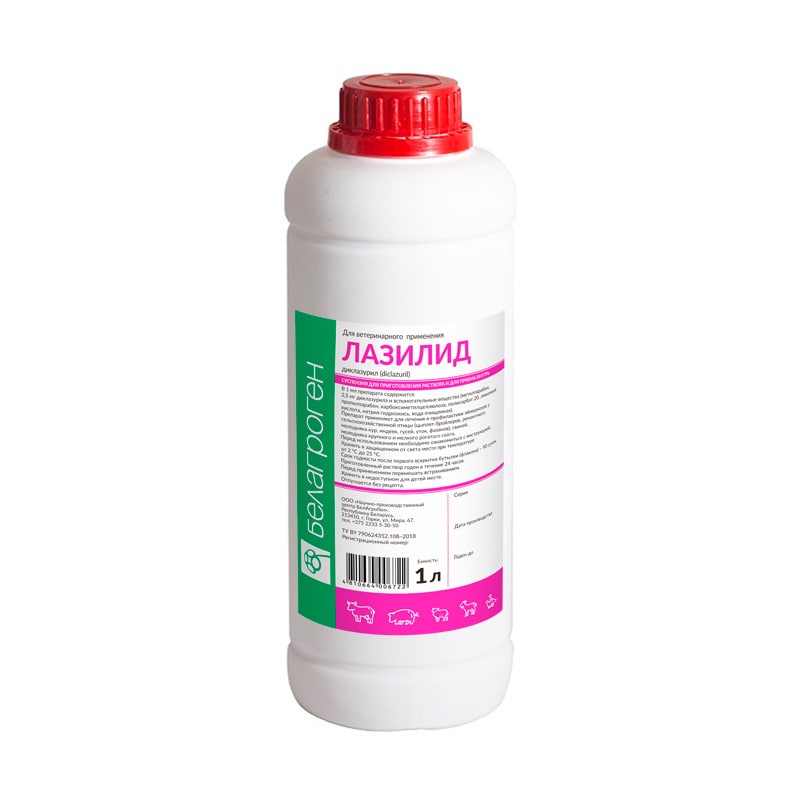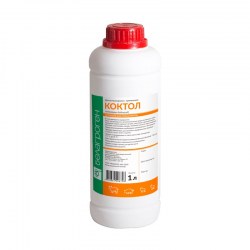+375 17 317 14 14 (отдел продаж)
Lazilide
Veterinary drug LAZILIDE
Treatment and prevention of eimeriosis
- Treatment of eimeriosis in various species of poultry
- Broad spectrum of anticoccidial action
- Highly effective against Eimeria species affecting the mucous and submucous membranes of the gastrointestinal tract
- Well-tolerated drug
- Does not suppress immunity
- Administered orally
Therapeutic indications:
The drug is used for the treatment and prevention of eimeriosis in poultry (broiler chickens, replacement chickens, turkeys, geese, ducks, pheasants), pigs, young cattle and small ruminants.
Composition of the veterinary drug:
1 ml of the drug contains:
- 2,5 mg of diclazuril as an active substance.
The drug is a synthetic eimeriostatic of the benzeneacetonitrile group.
The active substance of the drug diclazuril has a broad spectrum of anticoccidial action. LAZILIDE is highly effective against:
- eimeriosis in chickens (Eimeria necatrix, Eimeria tenella, Eimeria acervulina, Eimeria brunetti, Eimeria maxima, Eimeria mitis),
- eimeriosis in geese and ducks (Eimeria anceris, Eimeria truncata (Eimeria adenoides, Eimeria meleagrimitis),
- eimeriosis in pheasants (Eimeria phasiani),
- other species of eimeria parasitizing in poultry in the stage of intracellular development of the parasite, including eimeria, resistant to other anticoccidial drugs.
Diclazuril is effective against Isospora suis, Eimeria arloingi, Eimeria scabra, Eimeria guevarai, Eimeria bovis, Eimeria zuernii, Eimeria alabamensis and other species of eimeria parasitizing in pigs, cattle and small ruminants.
The mechanism of action of diclazuril: the active substance of the drug inhibits eimeria activity. Eimeria is a genus of intracellular parasitic protozoa that are found mainly in mucous and submucous membranes of the gastrointestinal tract.
Diclazuril disrupts the balance of homeostasis in the oocyst of eimeria, that leads to the death of parasitic protozoa in the stage of schizogenesis.
Diclazuril poorly accumulates in the body tissues and is excreted naturally, mainly with faeces. The elimination half-life of diclazuril is about 30 hours.
In recommended doses, the drug is well-tolerated in animals and poultry, has no mutagenic, carcinogenic (cancer inducing), embryotoxic and teratogenic effects. Diclazuril has no immunodepressant effect on immunity to eimeriosis.
Dosage:
Before using the drug, the bottle should be heat to room temperature and shaken thoroughly.
The drug is administered orally with drinking water or food individually or in groups. If necessary, the drug can be diluted with drinking water on a 1 to 10 ratio (at least 1 liter of the drug to 10 liters of drinking water). The prepared working solution may be administered in groups using a dispenser (medicator). When preparing a solution, make sure that you add the drug to water, and not vice versa.
LAZILIDE is given in the following doses and intervals:
- young cattle that are 4-6 weeks of age, goatlings and lambs - at a dose of 1 ml of the drug per 2.5 kg of body weight, which corresponds to 1 mg of diclazuril per 1 kg of body weight. LAZILIDE is injected individually by means of a syringe-dispenser. On farms where the risk of infestation is high, it is recommended to treat the animals once again 3 weeks after the first drug administration in the same dose;
- pigs and piglets from the 3rd day of life - at a dose of 2 ml of the drug per 1 kg of body weight, which corresponds to 5 mg of diclazuril per 1 kg of body weight. As for piglets, LAZILID is injected individually using a syringe-dispenser; as for adult pigs - the drug is administered in groups with drinking water during the day;
- poultry (broiler chickens, replacement chickens, turkeys, geese, ducks, pheasants) - the drug is administered in groups with food or drinking water at a dose of 0.4 ml of the drug per 1 kg of body weight, which corresponds to 1 mg of diclazuril per 1 kg body weight per day. The course of treatment is 2 days.
The prepared working solution should be used within a day.
When the risk of additional parasitic infection is high, the administration of the drug is repeated (with an interval of 14-21 days).
During the period of the drug treatment in groups, the prepared working solution should be the only source of drinking water for animals and poultry.
Precautions and adverse reactions:
When the drug is used in accordance with all these instructions, side effects and contraindications are generally not observed.
Do not use in animals and poultry with hypersensitivity to diclazuril.
In the case of allergic reactions (diarrhea, decreased appetite, erythema), the drug should be cancelled; and, if necessary, antihistamines, symptomatic treatment should be prescribed.
Do not use in pregnant females, in lactating animals. Do not use in poultry, which eggs are used for human consumption.
No peculiarities of the use of the drug in combination with other preparations have been revealed. Do not use the drug simultaneously with other anticoccidial drugs.
Withdrawal period:
Animals must not be slaughtered for human consumption before 5 days after the last drug administration. Meat of animals forcibly slaughtered before the specified period expires may be used for feeding carnivores.
Storage conditions:
Store in a dry, dark place at a temperature between + 2 ° C to + 25 ° C.
The drug should be kept out of the reach of children.
Shelf-life:
Shelf-life of the veterinary drug under appropriate storage conditions is 2 years from the date of manufacture, after the first opening of the bottle (vial) - 90 days. The shelf-life of the working solution is 24 days.





 Coktol
Coktol